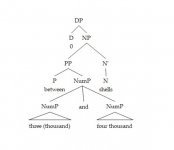What is a specifier? Would you explain briefly what specifiers do? Thank you.
A specifier is a structural position in the projection of a phrase in X-Bar syntax. It is the sister of the bar-level projection. They do various things in generative grammar, and what they do depends on the lexical category of the phrase.
The specifier of a Complementizer Phrase is often the docking point of wh-movement in relative clauses and root questions. Specifiers of Determiner Phrases (DPs) host possessors (minus the possessive morpheme). Thus, the DP
the boy in the DP
the boy's bicycle is the specifier of the DP
's bicycle. Even a Prepositional Phrase can have specifiers. The word
right in phrases like
right around the corner is commonly considered a specifier.
In mainstream generative grammar in the U.S., noun phrases usually occur inside determiner phrases, even when the determiner is null, as in
Shells passed overhead. Since we have a non-null determiner in DPs like
the between three (thousand) and four thousand shells which passed over our heads that day, it is clear that both the between phrase and the conjoined numeral/quantifier phrases it contains occur beneath the determiner in syntactic structure.
I wish to locate the numeral/quantifier phrase in the specifier position of the NP, (a) because that is an available position, and (b) because the numeral/quantifier phrase can occur within a prepositional phrase, as indeed it does in our example. I don't pretend to have discovered the perfect structure, but it does seem viable to me.
That day, between three and four thousand passed over our heads.
How would a grammarian analyse the sentence subject now?
The subject noun phrase simply has an elided head. Numerals licence noun-phrase ellipsis (e.g.,
How many marbles am I holding? - Two). Here is a tree I have made for the subject noun phrase of (1). I regard it as an
approximation of the truth rather than as the truth itself. The specifier is the left sister of N', inhabited by the PP.

